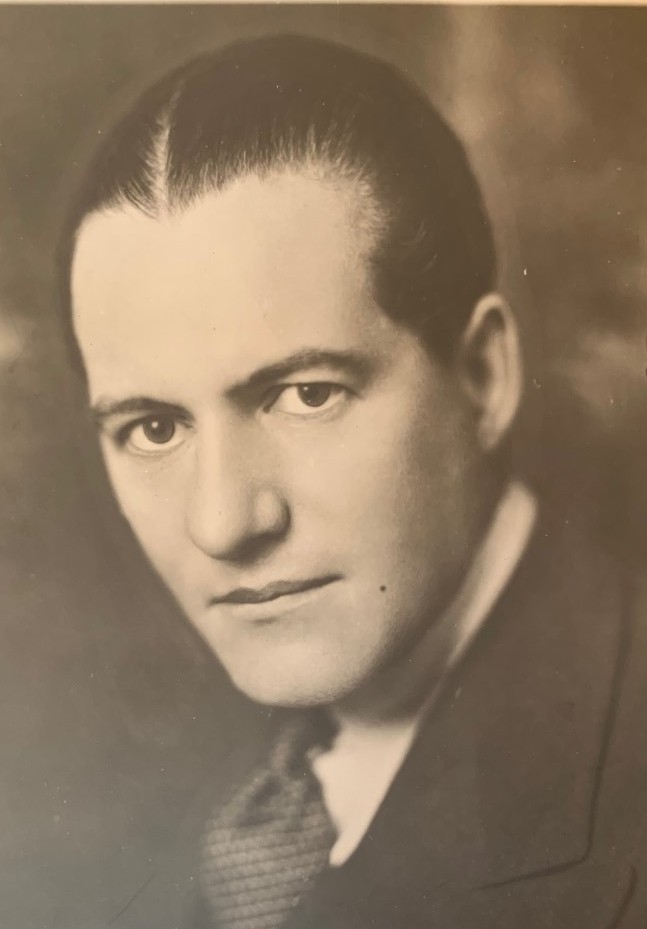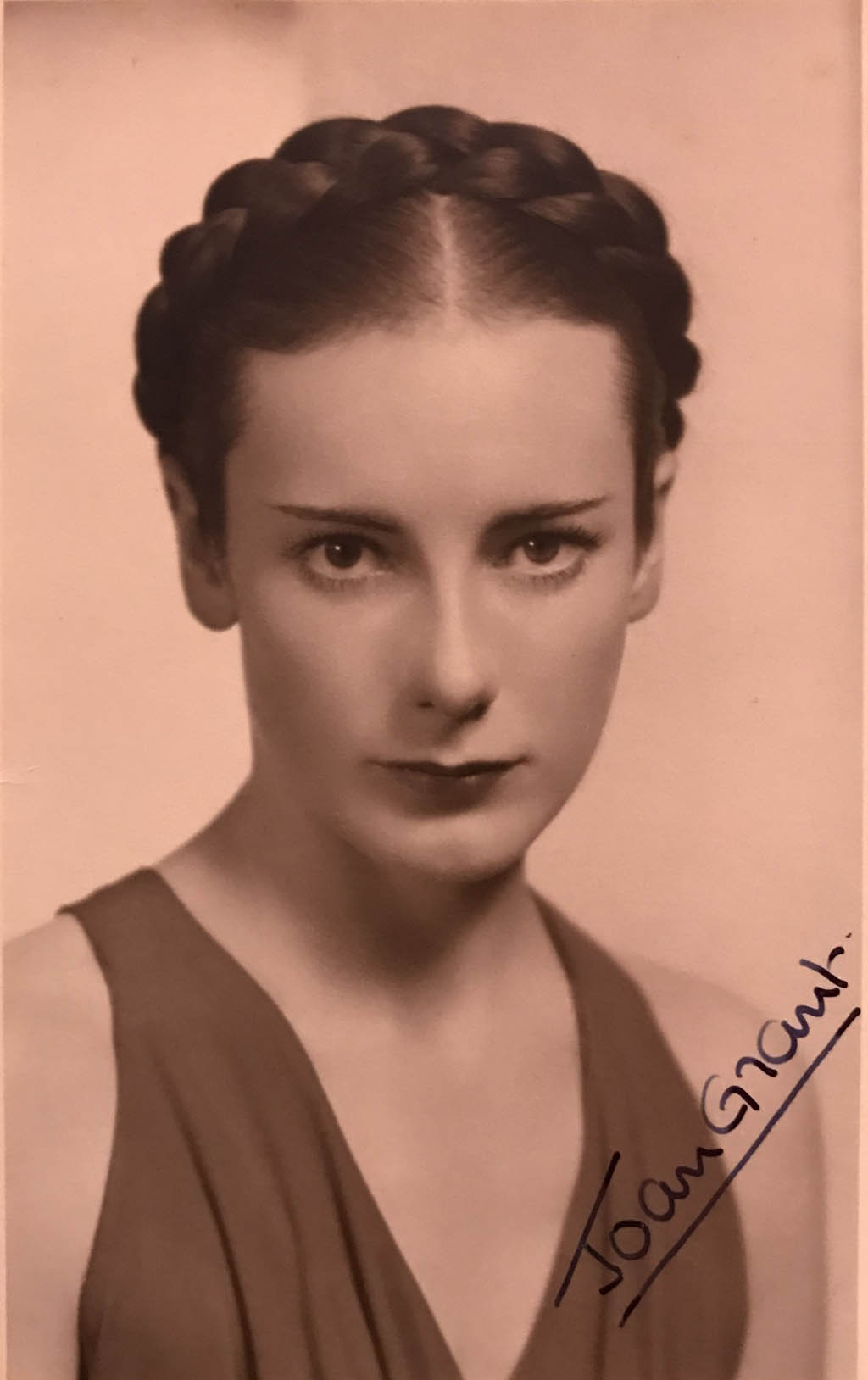
 |
Floor Plan |  |
The Dennis Wheatley 'Museum' - Champions of Reincarnation: Dennis Wheatley & Joan Grant
Champions of Reincarnation: Dennis Wheatley & Joan Grant
Dennis Wheatley and Joan Grant
in the 1930s
Click on the images to enlarge
One of the defining things about Dennis Wheatley was his long-held belief in re-incarnation.
As other Rooms have shown, this belief seems to have started in childhood, whether spurred on by the sighting of a ghost or not, and DW's reading as a young army officer under Gordon Tombe's supervision included several oriental religious texts, which would no doubt have given gravitas to his beliefs.
DW would also have been conscious in the inter-war period that a belief in some kind of afterlife was normal, even if you happened to be one of the very few who didn't subscribe to the Christian doctrine of heaven. After the First World War, many people believed in Spiritualism, including the great Sir Arthur Conan Doyle, who apart from his Sherlock Holmes and Challenger novels wrote a factual book called 'Wanderings of a Spiritualist'. No doubt in many cases, as in Conan Doyle's, people were seeking solace for the loss of loved ones.
A belief in the 'Wisdom of the East' had also been becoming increasingly fashionable from Victorian times onwards, as evidenced by the rise in popularity of Madame Blavatsky and her Theosophist movement.
Dennis Wheatley drew on all these inspirations - and all the potential demand it created - when writing his classic novel 'The Devil Rides Out', but at that time his religious beliefs had not fully matured.
One of the interesting challenges we have when seeking to divine Dennis Wheatley's religious beliefs at any stage is that we have somehow to separate fact from fiction. There is no doubt that DW believed much that he wrote, but there is no doubt that he also knew what his audience wanted; and that if he persuaded them that he believed in what he was writing, it would make it all the more convincing.
Hence the insertion of his 'Author's Note' at the front of the novel, which read :
'I desire to state that I, personally, have never
assisted at, or participated in, any ceremony
connected with Magic - Black or White'
Phil Baker rightly regarded this as a marketing masterstroke.
While DW will have been very much aware that much of what he wrote was fiction (such as those passages which he consciously adopted from Hope Hodgson's 'Carnacki' novels), it is virtually certain that he believed in the core tenets of the second century Iranian prophet Mani, who maintained there was a constant war between Good and Evil, and White against Black.
It seems unlikely however that this was part of a unified system of beliefs, but more one of a number of pieces in an incomplete puzzle - rather like much of twentieth century (and previous) occultism, and indeed much like the various ingredients that he mixed together to write his masterpiece.
It is clear both from DW's writings and also from his private correspondence (some of which is being made public here for the very first time) that meeting Joan Grant and reading her debut book 'Winged Pharaoh' changed much for DW and that it became the very foundation of his belief system, just as it did for many others.
For those who have not read it, 'Winged Pharaoh' is an extraordinary book, and this unknown work from an unknown author became a bestselling sensation of the late 1930s and 1940s, and remains a 'New Age' classic to this day.
It tells the story of a princess, later to be Pharaoh, of the Egyptian First Dynasty; the dawn of Ancient Egypt as we know it, several centuries before the building of the first pyramids.
Joan did not 'come out' about it all publicly until much later, but her friends and family knew that she believed it told the true story of one of her many previous incarnations, and that she had dictated it while in self-induced trances to her first husband Leslie.
DW quickly became friends with Joan (one sometimes has to be careful when reading letters, because DW's wife was also named Joan), and used his fame of five years standing to help boost her sales and publicise her book to a wider audience. This much is well known.
What has not been known, until now, is the role that Joan played in reading the initial manuscript of DW's second occult novel, 'Strange Conflict' (1941), and commenting on it. This she did at DW's explicit request, which he made because when writing the novel he wanted 'to keep the Occult stuff in line with the real thing as far as possible.'
DW and Joan were frequent correspondents while she was writing her next 'Far Memory' book on Ancient Egypt, 'Eyes of Horus', and DW and his family believed in Joan's revelations to such an extent that when his stepdaughter Diana went a bit 'off the rails' in the autumn of 1939, DW wrote to her warning that she had been fortunate so far in this life, having been born well-bred, in a 'civilised country', and with talent, but that if she went on being inconsiderate to others, this would rebound on her in a future life, and it would not be so fortunate.
DW was sorry when Joan (Grant) divorced her second husband Charles Beatty (Joan and her first husband having divorced shortly after she became famous), because - although he made a few negative remarks about Charles in later life - they had also become firm friends. Indeed, DW wrote the foreword to Charles Beatty's autobiographical study 'Gate of Dreams' in 1972, and ended it by saying:
"In my long life I have met only one living saint - Charles Beatty."
Joan had left Charles in order to marry psychiatrist, Denys Kelsey, and they moved for a while to a delightful part of France - the medieval village of Collonges-la-Rouge - where they treated people with a variety of psychological ailments with what is now known as regression analysis. They jointly wrote a book about this period with the title 'Many Lifetimes'.
Joan spent some time on the lecture circuit in the U.S.A., and while I am told it may not have been particularly remunerative, she met some distinguished people and made them friends.
After her initial successes - which brought her world-wide acclaim - Joan continued to write; some of her books being 'Far memory', two on travel, and one rather curious novel, as well as a book telling her story up to the publication of Winged Pharaoh and the book she co-wrote with Denys Kelsey. When she died she also left behind a quantity of unpublished material, some of which was recently published under the title 'Speaking From The Heart'.
Although the correspondence became less of a torrent as they grew older, Joan and Dennis wrote to each other regularly until Dennis's death on 10th November 1977, and as the relevant Room in this site's virtual Museum shows, he died a convinced believer in re-incarnation, albeit a slightly Anglicanised one.
Joan herself died on 3rd February 1989 in England, and although neither of them is now a 'name' that trips off everybody's tongues, in the late 1930s to the 1970s they were probably as responsible as anyone else (excepting the ancient religious leaders such as Gautama Buddha), for the popularity of a belief in re-incarnation in the literate West. And insofar as a belief in re-incarnation tends to promote in its adherents unselfish conduct, insofar as by promoting these beliefs in a time of world conflict they gave many people hope and comfort when otherwise they would have been desolate, and insofar as the result was some extremely good stories, we have all benefitted from their beliefs.
C.T.H.B.
September 2019


